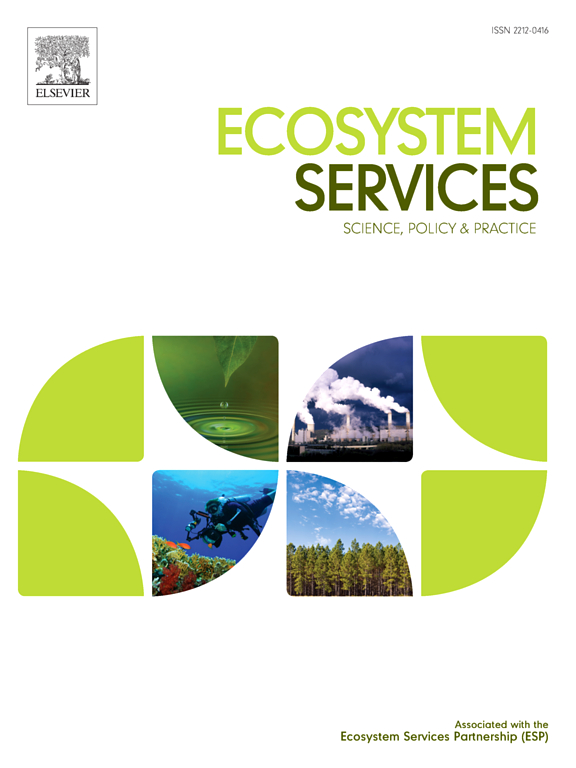Regenerative organic agriculture and soil ecosystem service delivery: A literature review
IF 6.6
2区 环境科学与生态学
Q1 ECOLOGY
引用次数: 0
Abstract
Regenerative Organic Agriculture (ROAg) can have several beneficial effects on soil health and the delivery of important soil ecosystem services. Yet, the net effect of multiple ROAg practices (i.e. minimum soil disturbance, crop rotation, cover cropping, organic fertilization, etc.) on soil health and ecosystem service delivery has been rarely assessed. The challenge remains to compare how diverse ROAg practices vs. conventional agriculture might influence soil biogeochemical properties using replicated field experiments lasting at least few years.
We performed a systematic literature review based on the Preferred Reporting Items for Systematic Reviews and Meta-Analysis (PRISMA) approach and selected English written peer-reviewed scientific papers focused on the effects that ROAg might have on soil health and soil ecosystem service delivery. Findings were analysed with a vote-count procedure and data extracted from comparative studies between conventional and regenerative organic agriculture were utilized to calculate an impact score. After screening 271 records, 24 studies met all the inclusion criteria. Among them, 17 research studies experimentally compared ROAg vs. conventional practices and quantitative data extracted from 63 observations were used for the impact assessment.
Our findings show that ROAg improved soil health and soil ability to deliver multiple ecosystem services. The vote-count including 45 observations from 24 selected studies, shows how ROAg had positive effects on soil ecosystem services in 64% of the total number of observations. The impact assessment analysis, which included quantitative data extracted from 63 experimental observations, also show positive effects on multiple soil ecosystem services and soil biogeochemical parameters. ROAg increased soil organic C (SOC; g kg−1) by 22 %, soil total nitrogen (STN; g kg−1) by 28 %, and soil microbial biomass carbon (MBC; g kg−1) by 133 % compared to conventional agriculture. The highest number of positive ROAg effects were associated with supporting services (e.g. SOM dynamics, soil nutrient and water cycling). A negative ROAg effect was observed on the ‘food and fiber production’ provisioning service, where yields (food quantity) were 24 % lower when compared to conventional agriculture. However, the only data available on potential links between soil management and plant health, shows ROAg positive effects on plant nutrient density (food quality).
Our review demonstrates that ROAg has significant positive impacts on soil health and ecosystem service delivery and highlights the need for long-term comparative studies across world regions to address knowledge gaps and assess potential economic, social and human health benefits associated with a greater implementation of ROAg practices.

再生有机农业与土壤生态系统服务提供:文献综述
再生有机农业(ROAg)可以对土壤健康和提供重要的土壤生态系统服务产生若干有益影响。然而,多种生态农业实践(即最小土壤干扰、作物轮作、覆盖种植、有机施肥等)对土壤健康和生态系统服务提供的净影响很少得到评估。挑战仍然是通过持续至少几年的重复现场实验来比较不同的ROAg实践与传统农业如何影响土壤生物地球化学特性。我们基于系统评价和荟萃分析的首选报告项目(PRISMA)方法进行了系统的文献综述,并选择了英文书面同行评议的科学论文,重点关注ROAg可能对土壤健康和土壤生态系统服务提供的影响。研究结果通过投票计数程序进行分析,并从传统有机农业和再生有机农业的比较研究中提取数据,用于计算影响评分。在筛选了271份记录后,有24项研究符合所有纳入标准。其中,17项研究对ROAg与常规做法进行了实验比较,并从63项观测中提取了定量数据进行了影响评估。我们的研究结果表明,ROAg改善了土壤健康和土壤提供多种生态系统服务的能力。投票计数包括来自24个选定研究的45个观测结果,显示ROAg如何在64%的观测总数中对土壤生态系统服务产生积极影响。利用63个试验观测的定量数据进行的影响评价分析也显示出对多种土壤生态系统服务和土壤生物地球化学参数的积极影响。ROAg增加了土壤有机碳(SOC);g kg−1)减少22%,土壤全氮(STN);g kg−1)减少28%,土壤微生物生物量碳(MBC;G kg−1)比传统农业低133%。最大数量的正面ROAg效应与支持服务(例如SOM动态、土壤养分和水循环)相关。在“食品和纤维生产”供应服务中观察到负ROAg效应,与传统农业相比,其产量(粮食数量)降低了24%。然而,关于土壤管理与植物健康之间潜在联系的现有唯一数据表明,ROAg对植物养分密度(食品质量)有积极影响。我们的综述表明,土壤农业对土壤健康和生态系统服务提供具有显著的积极影响,并强调需要在世界各地进行长期比较研究,以解决知识差距,并评估与更多实施土壤农业实践相关的潜在经济、社会和人类健康效益。
本文章由计算机程序翻译,如有差异,请以英文原文为准。
求助全文
约1分钟内获得全文
求助全文
来源期刊

Ecosystem Services
ECOLOGYENVIRONMENTAL SCIENCES&-ENVIRONMENTAL SCIENCES
CiteScore
14.90
自引率
7.90%
发文量
109
期刊介绍:
Ecosystem Services is an international, interdisciplinary journal that is associated with the Ecosystem Services Partnership (ESP). The journal is dedicated to exploring the science, policy, and practice related to ecosystem services, which are the various ways in which ecosystems contribute to human well-being, both directly and indirectly.
Ecosystem Services contributes to the broader goal of ensuring that the benefits of ecosystems are recognized, valued, and sustainably managed for the well-being of current and future generations. The journal serves as a platform for scholars, practitioners, policymakers, and other stakeholders to share their findings and insights, fostering collaboration and innovation in the field of ecosystem services.
 求助内容:
求助内容: 应助结果提醒方式:
应助结果提醒方式:


